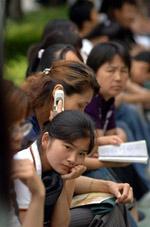The Beijing Olympics is around the corner. As the games approach, the Chinese regime has tightened its Internet control and started to take measures to cool down the “boycott Carrefour” activities inside China to prevent loss of control.
Because of the boycott of the Beijing Olympic Torch Relay by French people in Paris, French retail chain Carrefour became a target in China, especially for youth to express their dissatisfaction at the end of April.
According to Singapore’s Lianhe Zaobao newspaper on April 30, one cannot find any information about “Carrefour” on the Internet when searching with a mainland search engine.
It is an effective measure—only a few cities had protests on May 1, the beginning of a holiday season in China, with only several hundred participating.
Not long ago, large numbers of protesters showed up in front of Carrefour chain stores in many mainland cities, and many Internet surfers had called for a large-scale boycott of Carrefour during the May 1 holiday.
Looking Good to Foreigners
Regarding the strengthened Internet controls, executive editor of the U.S. based “China Information Center,” Liao Tianqi, commented: “The behavior of those Chinese youths, both inside the mainland and overseas, is very childish, ignorant, and actually breaches the law, especially with the boycott of Carrefour and doing some comical damage inside the Carrefour stores. The Chinese regime does not want the media to report on that, and certainly does not want overseas people knowing about that.”
Currently, the regime continues to send vague messages. Earlier, the Foreign Department spokesperson commented that the boycott activities “has its reasons,” and that the “French side should think over the event and review what happened before [the boycott].”
The regime seems to recognize the validation of the protests; yet on the other hand, official media such as the People’s Daily have published several articles telling the public that love of one’s county is “to do your own job well,” and “If Chinese people smile to the world, the world will smile back.”
This vague official message phenomenon is even more obvious on the topic of Tibet’s spiritual leader, the Dalai Lama. On the one side, Beijing has said that it agrees to talk with the Dalai Lama’s representative; on the other side, the People’s Daily has once again published articles that criticize the “Dalai Gang’s deeds.”
Turn It On—Turn It Off
Editor-in-Chief of the U.S. based Internet Chinese magazine China Affairs Wu Fan, commented, “The regime is handling the same event in two stages, in the first stage it adopted a hardline policy, such as instigating nationalism inside the mainland to counteract pressure from international communities on its human rights issues. After the students boycotted Carrefour and started to march on the street, it immediately put the brakes on, because things could get out of control.”
According to an AP report, at least nine people were arrested by the police during the protest in front of a Carrefour store in Haidian District in Beijing on May 1.



